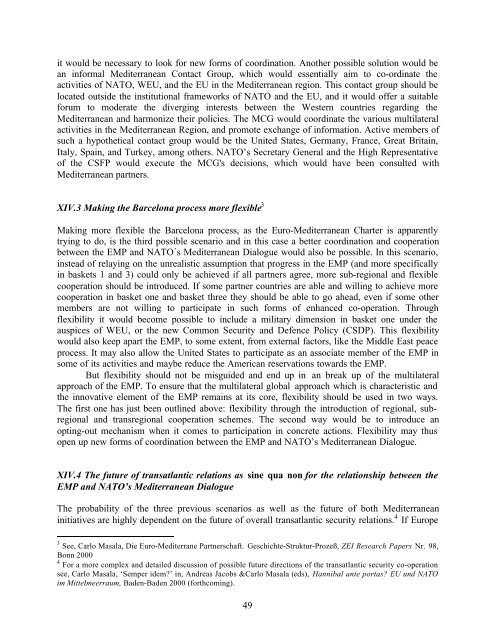The future of the Euro-Mediterannean security dialogue
The future of the Euro-Mediterannean security dialogue
The future of the Euro-Mediterannean security dialogue
Create successful ePaper yourself
Turn your PDF publications into a flip-book with our unique Google optimized e-Paper software.
it would be necessary to look for new forms <strong>of</strong> coordination. Ano<strong>the</strong>r possible solution would be<br />
an informal Mediterranean Contact Group, which would essentially aim to co-ordinate <strong>the</strong><br />
activities <strong>of</strong> NATO, WEU, and <strong>the</strong> EU in <strong>the</strong> Mediterranean region. This contact group should be<br />
located outside <strong>the</strong> institutional frameworks <strong>of</strong> NATO and <strong>the</strong> EU, and it would <strong>of</strong>fer a suitable<br />
forum to moderate <strong>the</strong> diverging interests between <strong>the</strong> Western countries regarding <strong>the</strong><br />
Mediterranean and harmonize <strong>the</strong>ir policies. <strong>The</strong> MCG would coordinate <strong>the</strong> various multilateral<br />
activities in <strong>the</strong> Mediterranean Region, and promote exchange <strong>of</strong> information. Active members <strong>of</strong><br />
such a hypo<strong>the</strong>tical contact group would be <strong>the</strong> United States, Germany, France, Great Britain,<br />
Italy, Spain, and Turkey, among o<strong>the</strong>rs. NATO’s Secretary General and <strong>the</strong> High Representative<br />
<strong>of</strong> <strong>the</strong> CSFP would execute <strong>the</strong> MCG's decisions, which would have been consulted with<br />
Mediterranean partners.<br />
XIV.3 Making <strong>the</strong> Barcelona process more flexible 3<br />
Making more flexible <strong>the</strong> Barcelona process, as <strong>the</strong> <strong>Euro</strong>-Mediterranean Charter is apparently<br />
trying to do, is <strong>the</strong> third possible scenario and in this case a better coordination and cooperation<br />
between <strong>the</strong> EMP and NATO´s Mediterranean Dialogue would also be possible. In this scenario,<br />
instead <strong>of</strong> relaying on <strong>the</strong> unrealistic assumption that progress in <strong>the</strong> EMP (and more specifically<br />
in baskets 1 and 3) could only be achieved if all partners agree, more sub-regional and flexible<br />
cooperation should be introduced. If some partner countries are able and willing to achieve more<br />
cooperation in basket one and basket three <strong>the</strong>y should be able to go ahead, even if some o<strong>the</strong>r<br />
members are not willing to participate in such forms <strong>of</strong> enhanced co-operation. Through<br />
flexibility it would become possible to include a military dimension in basket one under <strong>the</strong><br />
auspices <strong>of</strong> WEU, or <strong>the</strong> new Common Security and Defence Policy (CSDP). This flexibility<br />
would also keep apart <strong>the</strong> EMP, to some extent, from external factors, like <strong>the</strong> Middle East peace<br />
process. It may also allow <strong>the</strong> United States to participate as an associate member <strong>of</strong> <strong>the</strong> EMP in<br />
some <strong>of</strong> its activities and maybe reduce <strong>the</strong> American reservations towards <strong>the</strong> EMP.<br />
But flexibility should not be misguided and end up in an break up <strong>of</strong> <strong>the</strong> multilateral<br />
approach <strong>of</strong> <strong>the</strong> EMP. To ensure that <strong>the</strong> multilateral global approach which is characteristic and<br />
<strong>the</strong> innovative element <strong>of</strong> <strong>the</strong> EMP remains at its core, flexibility should be used in two ways.<br />
<strong>The</strong> first one has just been outlined above: flexibility through <strong>the</strong> introduction <strong>of</strong> regional, subregional<br />
and transregional cooperation schemes. <strong>The</strong> second way would be to introduce an<br />
opting-out mechanism when it comes to participation in concrete actions. Flexibility may thus<br />
open up new forms <strong>of</strong> coordination between <strong>the</strong> EMP and NATO’s Mediterranean Dialogue.<br />
XIV.4 <strong>The</strong> <strong>future</strong> <strong>of</strong> transatlantic relations as sine qua non for <strong>the</strong> relationship between <strong>the</strong><br />
EMP and NATO’s Mediterranean Dialogue<br />
<strong>The</strong> probability <strong>of</strong> <strong>the</strong> three previous scenarios as well as <strong>the</strong> <strong>future</strong> <strong>of</strong> both Mediterranean<br />
initiatives are highly dependent on <strong>the</strong> <strong>future</strong> <strong>of</strong> overall transatlantic <strong>security</strong> relations. 4 If <strong>Euro</strong>pe<br />
3 See, Carlo Masala, Die <strong>Euro</strong>-Mediterrane Partnerschaft. Geschichte-Struktur-Prozeß, ZEI Research Papers Nr. 98,<br />
Bonn 2000<br />
4 For a more complex and detailed discussion <strong>of</strong> possible <strong>future</strong> directions <strong>of</strong> <strong>the</strong> transatlantic <strong>security</strong> co-operation<br />
see, Carlo Masala, ‘Semper idem?’ in, Andreas Jacobs &Carlo Masala (eds), Hannibal ante portas? EU und NATO<br />
im Mittelmeerraum, Baden-Baden 2000 (forthcoming).<br />
49
















